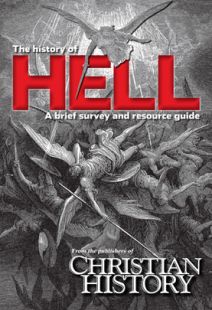Milton Sold Epic "Paradise Lost" for a Bargain Price
JOHN MILTON was born in 1608 near the onset of the great power struggle between king and Parliament. His Puritan family had suffered losses for their faith, and it was natural that Milton should side with the Puritans and Parliament. He would one day advocate the separation of church and state and call for the kind of liberty that western nations came to enjoy in later centuries.
As a young man, he wrote poems that revealed his genius. The most famous of these were “L’Allegro” and “Il Penseroso.” Although he had already conceived the idea of writing a great epic, for twenty years (1640-1660) he wrote only political pamphlets, including a Latin defense of the English people’s execution of King Charles the First. He served as Latin secretary to Cromwell’s regime.
When Cromwell died and Charles II was restored to the English throne, Milton had to go into hiding. Friends even faked a funeral to make it appear that he was dead. By then, Milton was blind and very poor, and so he finally applied himself to the epic he had dreamed of writing. The result was Paradise Lost, a poem in twelve books. To maintain its solemn tone, he wrote largely in blank verse using the sturdiest meter of English poetry—iambic pentameter. He also employed an unobtrusive alliteration throughout the work.
The title refers to the fall of mankind when Eve plucked the forbidden fruit in the garden of Eden and shared it with Adam, a moment Milton recreated with the lines:
So saying, her rash hand in evil hour
Forth reaching to the fruit, she plucked, she eat.
Earth felt the wound, and Nature from her seat,
Sighing through all her works, gave signs of woe
That all was lost.
On this day, April 27, 1667, Milton sold his magnificent epic, conveying the rights for Paradise Lost to Samuel Simmons. Because of the cloud under which the poet lived, Simmons was uneasy to have it known that he was the publisher and did not include his name on the original title page when he printed thirteen hundred copies that August. Milton received only £5 from the transaction, with the promise of five more if a second printing of thirteen hundred was required. It was, and he earned a second £5, but was dead before a third printing was called for.
Despite its slow start, the masterpiece eventually sold millions of copies and many readers ranked it as second only to the Bible for magnificence. The work ends with God’s promise of restoration through Jesus Christ. Next to God the Father, Christ is the most exalted being in the poem, described by Milton in this manner:
Beyond compare the Son of God was seen
Most glorious; in him all his Father shone
Substantially express’d; and in his face
Divine compassion visibly appear’d,
Love without end, and without measure grace.
However, some critics complained that Milton’s view of Christ was Arian—that his Christ was a created being. Believers in the doctrine of predestination also objected that Adam and Eve were made free agents of their own sin.
“. . .they themselves decreed
their own revolt, not I. If I foreknew,
Foreknowledge had no influence on their fault.”
Whatever its errors of theology, imagined or real, even Milton’s enemies admit his epic surpassed anything done in English on that scale. Indeed, in all of Christian literature, only Dante’s Divine Comedy is considered superior.
—Dan Graves
----- ----- -----
Milton was famous for his depiction of Satan as lord of Hell. For more, see the History of Hell






